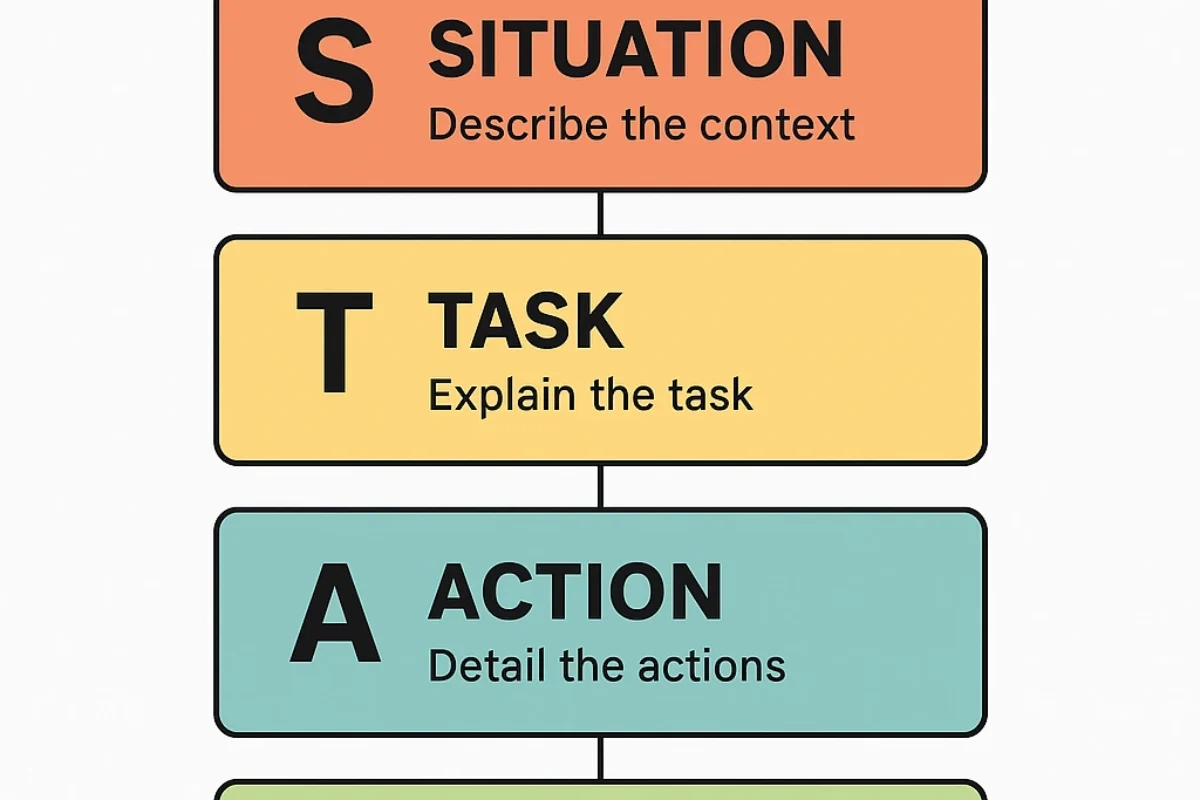You’ve landed the interview. Your resume and cover letter did their job, and now you’re one step closer to your first professional role. But as the day approaches, a sense of dread begins to set in. What entry-level interview questions will they ask? How do you respond to entry-level interview questions about experience when you have very little? Preparing for common entry-level interview questions can help you feel confident and ready to shine. By practicing answers to entry-level interview questions, you can stand out from the other graduates and make a memorable impression.
Walking into your first professional interview can feel like stepping into an exam you haven’t studied for. But it doesn’t have to be that way. The secret to acing your interview is preparation. Familiarizing yourself with common entry-level interview questions and practicing answers to typical entry-level interview questions helps reduce nerves. By understanding how to approach various entry-level interview questions and structuring your responses thoughtfully, you turn anxiety into confidence. Preparing for a range of entry-level interview questions ensures you can handle whatever comes your way and make a strong impression.
This guide is your ultimate interview prep tool. We’ve compiled the most common entry-level interview questions, broken them down by category, and provided strategies to tackle each one. Alongside model answers for entry-level interview questions, you’ll learn how to structure your responses confidently. By reviewing these entry-level interview questions and practicing your approach, you can enter the room calm and prepared. Understanding a range of entry-level interview questions ensures you’re ready to demonstrate why you’re the perfect candidate for the job.
- Why Preparation is Everything for Entry-Level Interview Questions
- Part 1: The “Get to Know You” Questions
- Part 2: Behavioral Questions (Your Time to Shine with STAR)
- Part 3: Questions About Your Strengths and Weaknesses
- Part 4: Questions About Your Future and Career Goals
- Part 5: The Closing Question
- 7 Common Interview Mistakes Graduates Make
- Frequently Asked Questions (FAQ)
- Conclusion: Preparation is the Key to Confidence
Why Preparation is Everything for Entry-Level Interview Questions
Interviewers don’t ask these questions to trick you; they ask them to understand three key things: Can you do the job? Will you fit in with the team? And are you genuinely motivated to be here? Proper preparation allows you to:
- Demonstrate Your Competence: By providing clear, evidence-based answers.
- Showcase Your Personality: By telling engaging stories that reveal your character.
- Prove Your Interest: By showing you’ve researched the company and thought deeply about the role.

For more career guidance, you can always explore resources like infoinaja.com.
Part 1: The “Get to Know You” Questions
These foundational questions are common entry-level interview questions meant to break the ice and get to know your background. Practicing these entry-level interview questions helps you share your motivations clearly. Understanding typical entry-level interview questions also ensures you can highlight your skills effectively. By reviewing a variety of entry-level interview questions, you feel more confident in presenting your experience and personality.
1. “Tell me about yourself.”
What they’re really asking: “Give me your 90-second elevator pitch that connects your past to this job.”
Model Answer: “I recently graduated Magna Cum Laude from [Your University] with a degree in [Your Major]. During my studies, I developed a strong passion for [Your Industry], particularly in the area of [Specific Skill 1]. I honed this skill during my internship at [Company Name], where I had the opportunity to [mention a key accomplishment]. I was really drawn to this role at [Their Company Name] because of your commitment to [Company Value], and I’m eager to bring my skills in [Specific Skill 2] to your team.”
2. “Why are you interested in this role?”
What they’re really asking: “Have you actually read the job description?”
Model Answer: “I’m particularly interested in this role because it seems to be a perfect blend of my two main strengths: [Skill 1] and [Skill 2]. I was excited to see that the responsibilities include [Mention a specific duty from the job description], as that’s an area where I excelled in my [Relevant project or internship]. I’m looking for an entry-level role where I can not only apply my academic knowledge but also learn and grow, and this position seems to offer that perfect opportunity.”
3. “Why do you want to work for our company?”
What they’re really asking: “Why us, specifically? Have you done your research?”
Model Answer: “I’ve been following [Their Company Name] for a while, and I’ve been consistently impressed by your work in [Specific Area], especially the [Mention a specific project, product, or news article]. Your company’s commitment to [Company Value, e.g., innovation or sustainability] really resonates with my own professional values. I’m not just looking for a job; I’m looking for a company where I can be proud of the work I’m doing, and I believe [Their Company Name] is that place.”
Part 2: Behavioral Questions (Your Time to Shine with STAR)
These questions are designed to see how you’ve handled situations in the past. Always use the STAR method (Situation, Task, Action, Result) to structure your answers.

4. “Tell me about a time you worked on a team.”
What they’re really asking: “Are you a good collaborator?”
Model Answer: Use a STAR story about a successful team project. Focus your “Action” on what *you* specifically did to contribute, such as “I took the lead on organizing our project timeline using Trello…” and a “Result” that highlights the team’s success, “…which helped us complete the project ahead of schedule and receive a high grade.”
5. “Describe a time you had to solve a difficult problem.”
What they’re really asking: “What is your thought process when faced with a challenge?”
Model Answer: Choose a specific, tangible problem. In your “Action” section, walk them through your logical steps: “First, I analyzed the data to understand the root cause. Then, I brainstormed three potential solutions. After weighing the pros and cons, I implemented the most efficient option…” The “Result” should be the successful resolution of the problem.
Part 3: Questions About Your Strengths and Weaknesses
These questions assess your self-awareness and your potential for growth.
6. “What is your greatest strength?”
What they’re really asking: “What is your most relevant skill for this job?”
Model Answer: Choose a strength that is directly relevant to the job description. Don’t just state it; give a brief example. “My greatest strength is my ability to learn new software quickly. For example, in my last internship, I was asked to use a new CRM system and was able to become proficient in it within a week by going through the tutorials and creating my own practice projects.”
7. “What is your biggest weakness?”
What they’re really asking: “Are you self-aware, and are you committed to self-improvement?”
Model Answer: Choose a real but minor weakness and, most importantly, show what you’re doing to improve it. “In the past, I’ve sometimes struggled with public speaking anxiety. To address this, I joined my university’s public speaking club, where I practiced presenting regularly. While I’m still working on it, I’ve become a much more confident and effective presenter, and I now see it as a skill I’m actively developing.”
Part 4: Questions About Your Future and Career Goals
These questions are designed to see if your ambitions align with the company’s trajectory.
8. “Where do you see yourself in five years?”
What they’re really asking: “Are you ambitious, and does this role fit into your long-term plan?”
Model Answer: “In five years, I hope to have become a true expert in [Your Field] and to have taken on more responsibility, perhaps leading small projects or mentoring new team members. I’m excited about this role because it seems to provide a strong foundation and clear growth path to achieve those goals right here at [Their Company Name].”
Part 5: The Closing Question
9. “Do you have any questions for us?”
What they’re really asking: “Are you genuinely interested and engaged?”
Model Answer: The answer should always be “Yes.” Prepare 3-5 thoughtful questions. Good examples include:
- “What does a typical day look like in this role?”
- “What are the biggest challenges the team is currently facing?”
- “How does your team measure success?”
- “What are the opportunities for professional development and growth in this role?”
7 Common Interview Mistakes Graduates Make
Avoid these frequent blunders that can cost you the job:
- Not Researching the Company: You must be able to articulate why you want to work for *them*.
- Dressing Inappropriately: It’s always better to be slightly overdressed than underdressed. When in doubt, business casual is a safe bet.
- Rambling or Giving Vague Answers: Prepare your STAR stories to keep your answers concise and impactful.
- Speaking Negatively About Past Experiences: Never badmouth a previous employer, professor, or team member.
- Not Showing Enthusiasm: Your body language and tone of voice matter. Sit up straight, make eye contact, and smile.
- Forgetting to Send a Thank-You Note: Send a brief, personalized thank-you email to your interviewer(s) within 24 hours.
- Having No Questions to Ask: This is a major red flag that signals a lack of interest.
Frequently Asked Questions (FAQ)
What is the hardest interview question for a graduate?
The hardest question is often ‘Tell me about yourself.’ It’s not a trick question, but its open-ended nature can cause candidates to ramble. The best approach is to prepare a concise, 60-90 second ‘elevator pitch’ that connects your background, your key skills, and your passion for this specific role.
How do I answer ‘What is your biggest weakness?’ without sounding bad?
Choose a real, minor weakness and, most importantly, show what steps you are actively taking to improve it. For example, ‘I used to struggle with public speaking, so I joined a Toastmasters club at my university to build my confidence, which has helped me become a much more effective presenter.’
Should I have questions to ask the interviewer at the end?
Yes, always. Having no questions can signal a lack of interest. Prepare 3-5 thoughtful questions about the team, the company culture, the challenges of the role, or what success looks like in the first 90 days. This shows you are engaged and genuinely interested.
How can I answer questions about experience when I don’t have any?
As a graduate, your ‘experience’ comes from internships, academic projects, volunteer work, and part-time jobs. Don’t discount these. Use the STAR method to frame a complex university project as a real-world example of your project management or teamwork skills.
Is it okay to say ‘I don’t know’ in an interview?
While you should be prepared, it’s better to be honest than to bluff. If you don’t know the answer to a technical question, it’s okay to say, ‘That’s a great question. I haven’t had direct experience with that specific software, but I’m a fast learner and I would approach it by…’ This shows honesty and a proactive, problem-solving mindset.
